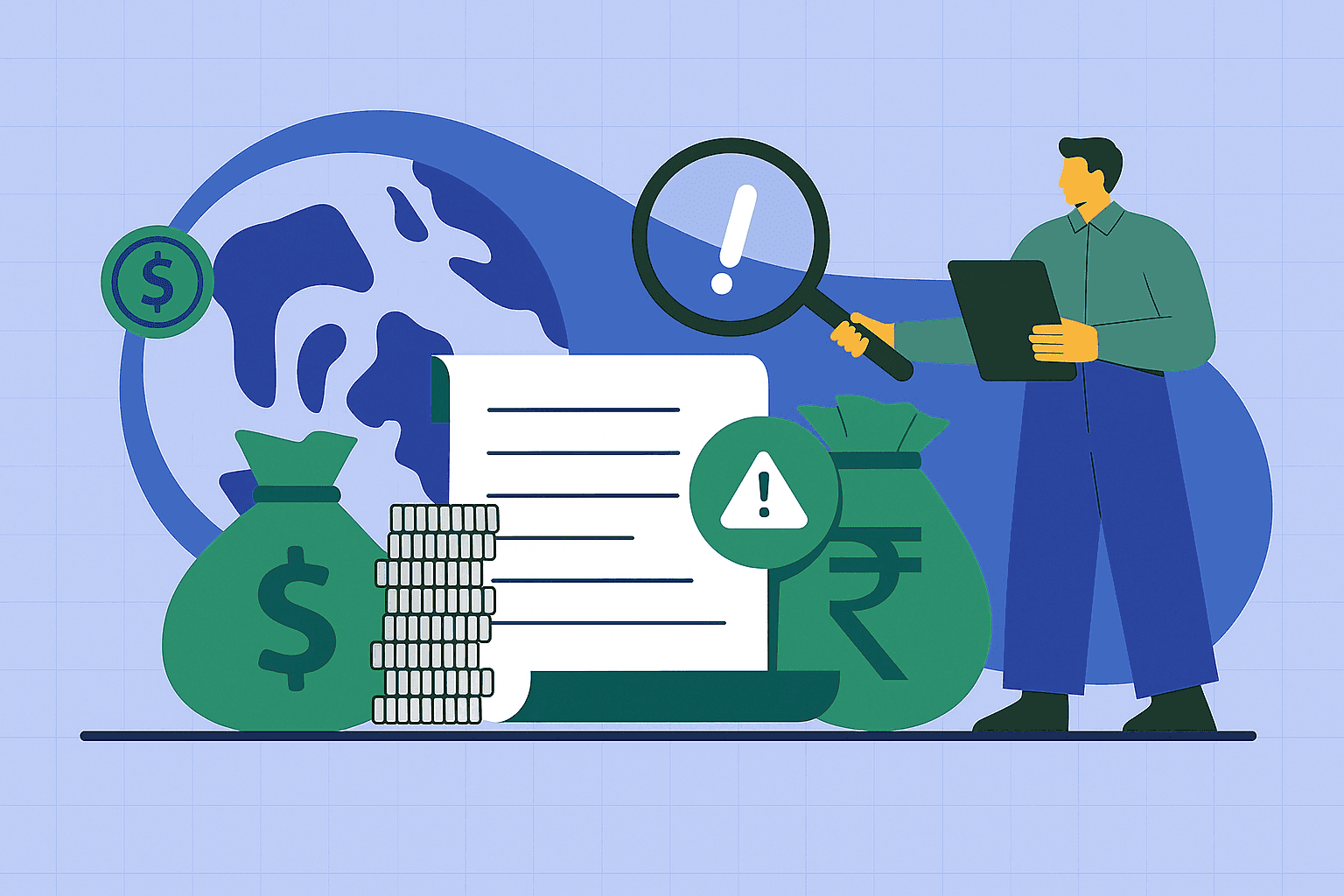EOU Full Form & How Export Oriented Units Help You Save on Customs Duties

EOU Full Form: What Does It Stand For?
EOU stands for Export Oriented Unit - it's a special business status that allows you to import raw materials and machinery without paying customs duties. The trade-off here is that you commit to exporting most of what you produce.
When freelancers and small businesses search for "EOU full form in export" or "EOU full form in customs," they're usually trying to understand this specific scheme that helps Indian companies compete globally by reducing their import costs.
Export Oriented Units are those units that undertake to export their entire goods and services under India's Foreign Trade Policy. The scheme started in 1981 to promote exports and increase net foreign exchange earnings.
The beauty of the EOU scheme is its simplicity. If you're genuinely focused on exports, the government makes it easier to access inputs without the usual customs headaches that can eat into your margins.
Who Should Care About EOU? (And Why It Matters)
The scheme is most effective for manufacturers and large-scale exporters that regularly import raw materials, components, or machinery.
For example, textile manufacturers bringing in fabric, electronics companies importing components, or jewellery makers sourcing precious metals. These businesses see immediate impact because they're already dealing with hefty customs bills every month.
B2B hardware exporters, in particular, benefit since they often require specialised equipment and materials that are subject to high import duties. When you're importing $50,000 worth of materials monthly and paying 15-25% in various responsibilities, the savings add up fast.
Here's where it gets tricky for most freelancers and service providers. If you're doing SaaS development, content writing, or digital marketing services, the EOU scheme won't directly help since your main "inputs" are skills and software subscriptions.
But understanding EOU still matters if you're service-focused. Many freelancers eventually scale into product businesses - that graphic designer might start selling merchandise internationally, or the developer might launch hardware. Knowing about EOU gives you a head start for these transitions.
How Does an Export-Oriented Unit Work?
The EOU scheme operates on a straightforward deal with the government: you commit to exporting 100% of your production (with some flexibility), and in return, you are allowed to import your inputs without paying customs duties.
- EOUs get special customs and duty exemptions that regular businesses don't have access to. When you import raw materials, machinery, or components for your EOU, you skip the usual 10-25% customs duties that would normally apply. This isn't a refund system where you pay first and claim back later - the goods come in duty-free from day one.
- The Development Commissioner oversees the entire scheme, working closely with customs authorities to ensure everything runs smoothly. They're the ones who grant permissions, monitor compliance, and handle any issues that come up. Consider them your primary point of contact for all EOU-related matters.
Goods remain duty-free as long as they're exported. If you decide to sell some of your production in the domestic market (which is allowed up to 50% of your export value), you'll need to pay the duties that were initially exempted.
This ensures the system remains honest and that the benefits genuinely support export activities.
One important limitation that many people overlook is that EOUs aren't restricted to specific zones or locations, unlike Special Economic Zones (SEZs).
You can set up an EOU anywhere in India as long as you meet the scheme's criteria. This flexibility makes it accessible to businesses in smaller cities or rural areas that want to tap into export markets without relocating to designated industrial zones.
Benefits of EOU Registration
The customs duty exemptions are the headline benefit that draws most businesses to the EOU scheme.
- EOUs can import raw materials and capital goods completely duty-free, which immediately reduces your input costs by 15-30%, depending on the type of goods being imported. This isn't just about basic customs duty - you also skip additional duties that would normally apply.
- GST refund eligibility is another major advantage that improves your cash flow. When you purchase materials domestically for your EOU operations, you can claim a refund of the GST paid. This means you're not stuck waiting months for refunds or tying up working capital in tax payments.
- The real game-changer is access to imported goods at reduced cost across your entire supply chain. Whether you're importing machinery, raw materials, or specialized components, you're essentially getting wholesale international pricing without the usual government markup through duties and taxes.
- EOUs also get faster clearances through the Green Channel in many cases, though this depends on your compliance history and the specific customs office you're dealing with. When your shipments don't get stuck in customs for weeks, you can maintain better delivery schedules and reduce the working capital tied up in transit inventory.
EOU vs SEZ vs STPI: What’s the Difference?
Understanding these three export schemes can save you from applying to the wrong one and wasting months in the process. Each targets different types of businesses and comes with its own set of rules.

EOUs (Export-Oriented Units) are designed for businesses focused on product exports, such as manufacturing, textiles, or hardware. You can set up an EOU anywhere in India, offering location flexibility that other schemes don't provide. The GST refund process is straightforward, and you get duty-free imports as long as you export your production.
SEZs (Special Economic Zones) cast a wider net, supporting all types of exports from manufacturing to services. However, you're restricted to specific designated zones, which limits where you can operate. The GST situation becomes more complex in SEZs - while you may not be required to pay GST on specific transactions, the refund process can be more complicated, depending on your particular setup.
STPI (Software Technology Parks of India) focuses specifically on IT and software exports. There are no location restrictions, so you can operate from anywhere in India. The GST refund process works well for tech services, and the compliance requirements are generally more suited to software development workflows.
Can Freelancers or Service Exporters Use the EOU Scheme?
No - the EOU scheme is specifically designed for goods exports, not services. If you're a freelancer doing web development, content writing, or digital marketing for international clients, EOU won't help you.
The scheme requires you to manufacture or produce physical products that can be exported. Even if you're creating software products, the EOU framework isn't built for digital deliverables. You need tangible goods that can be physically tracked through customs.
If you're exporting software or IT services, the STPI is the relevant scheme you should consider instead. STPI (Software Technology Parks of India) is specifically designed for tech services and software exports, with compliance processes that are tailored to digital work.
For most service exporters, there are better and simpler options that don't require the complexity of special schemes:
LUT under GST (Letter of Undertaking) lets you export services without paying GST upfront, then claim refunds later. This is probably the most straightforward option for freelancers who are already registered for GST.
The Foreign Inward Remittance Certificate (FIRC) helps you properly document your export earnings for tax purposes and RBI compliance. Every service exporter should understand this regardless of which scheme they use.
Platforms like Skydo handle the compliance side automatically, making it easier to receive international payments without worrying about export documentation or RBI requirements.
The bottom line: if you're doing services, don't waste time applying for EOU. Focus on GST LUT and proper documentation instead.
How to Register as an EOU (Only if you're eligible)
The EOU registration process is more straightforward than most people expect, but it requires getting each step right to avoid delays and rejections.
Submit your application to the Development Commissioner with detailed information about your proposed operations, export plans, and investment details. You need to demonstrate genuine export potential and explain how you'll meet the scheme's requirements. The Development Commissioner's office will review your application and either approve or reject it based on your sector and feasibility.
Once approved, you'll receive a Letter of Permission (LoP) that gives you official authorization to set up your EOU. This letter is valid for two years, during which you must establish your operations and install the necessary equipment. If you need more time, you can request a one-year extension; however, please note that multiple extensions are not guaranteed.
Install bonding and customs procedures at your premises before you can start importing duty-free goods. This involves customs officials inspecting your facility and setting up tracking systems to monitor what comes in and goes out. The bonding process ensures that duty-free imports are only used for export production, not diverted to the domestic market.
Throughout your operations, you must maintain Net Foreign Exchange (NFE) obligation - essentially proving that your exports generate more foreign currency than you spend on imports. This is calculated over a five-year block period, providing you with some flexibility during tough years, as long as you maintain a positive NFE cumulatively.
Do You Need to Know About EOUs?
If you're in services, EOUs aren't directly applicable to your current setup. However, if you plan to scale into manufacturing exports or hybrid product-service models, this knowledge becomes valuable for future planning.
The key is staying aware of export schemes that match your business model. For service exporters, focus on GST LUT and proper documentation rather than pursuing manufacturing-focused benefits.
Whether you're using traditional export schemes or modern solutions like Skydo for seamless international payments and compliance, understanding the landscape helps you make better decisions as your business evolves.
Keep EOUs in your back pocket for when you're ready to move beyond pure services.
What is the full form of EOU?
EOU stands for Export Oriented Unit, a scheme designed to boost exports of physical goods from India by offering duty-free imports and compliance benefits.
Who is eligible for the EOU scheme?
Can freelancers or service exporters apply for the EOU scheme?
What are the benefits of registering as an EOU?












